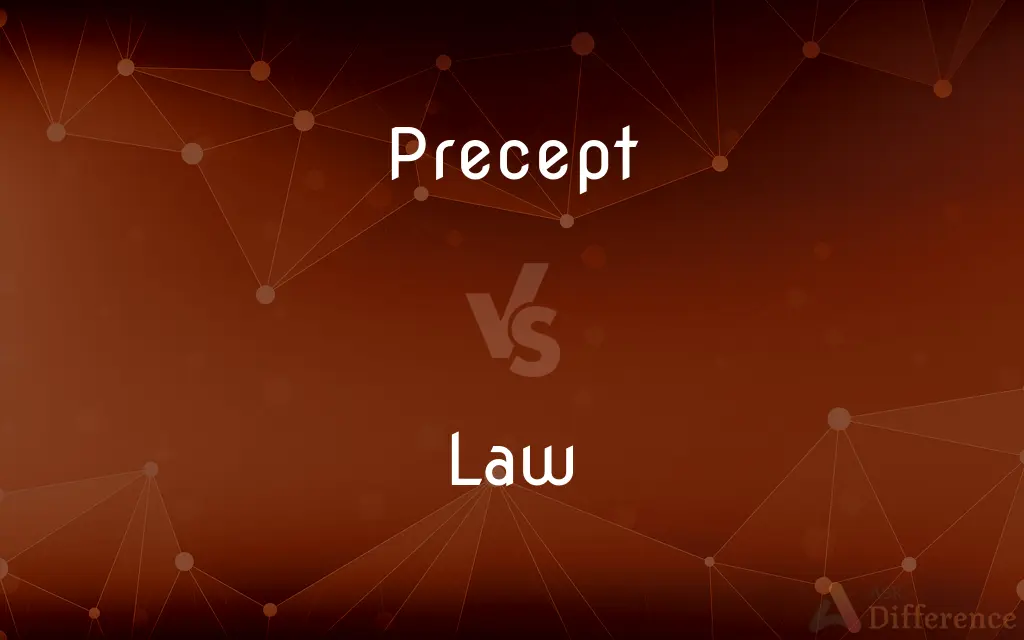Precept vs. Law — What's the Difference?
By Urooj Arif & Fiza Rafique — Updated on March 27, 2024
A precept is a general rule intended to regulate behavior or thought, emphasizing moral guidance, while a law is a system of rules enforced through social or governmental institutions to regulate conduct.

Difference Between Precept and Law
Table of Contents
ADVERTISEMENT
Key Differences
Precepts are foundational to guiding principles or moral codes, offering broad advice or instructions for conduct, primarily in ethical or moral contexts. They are often derived from philosophical, religious, or cultural beliefs, aiming to influence personal behavior and thought. On the other hand, laws are specific rules established and enforced by a governing authority, with clear legal consequences for violations. These are designed to maintain order and protect rights within a society, applying universally to its members.
While precepts serve as guidelines to encourage desired behaviors or thought patterns, focusing on personal growth and moral integrity, laws act as binding regulations that mandate or prohibit certain actions within a community or nation. Laws carry legal authority, with mechanisms in place for enforcement and penalties for non-compliance, whereas precepts rely more on individual acceptance and internal motivation for adherence.
Precepts often leave room for interpretation, allowing individuals to apply them according to personal understanding and situations. They are more about influencing values and ethics on a personal level. In contrast, laws are explicitly defined to minimize ambiguity, ensuring clear understanding and uniform application across all individuals subjected to them, with defined processes for adjudication and enforcement.
The source of precepts is usually philosophical, religious, or cultural teachings, reflecting the wisdom and insights of those traditions. They guide individuals towards what is considered morally right or desirable in a given community. Meanwhile, laws are created through legislative processes, reflecting the collective agreement or mandate of a society about acceptable and unacceptable behaviors, with the intention of promoting social order and welfare.
Precepts and laws, though both aimed at guiding human behavior, differ significantly in their approach, enforcement, and origins. Precepts encourage voluntary adherence based on moral or ethical considerations, whereas laws require compliance, backed by the authority of the state and its capacity to enforce rules and impose penalties.
ADVERTISEMENT
Comparison Chart
Definition
A general rule intended to guide behavior or thought
A system of rules enforced by governmental institutions
Focus
Moral or ethical guidance
Regulation of conduct with legal consequences
Enforcement
Based on personal acceptance and ethics
Legal authority with penalties for violations
Source
Philosophical, religious, or cultural teachings
Legislative processes and governmental decree
Ambiguity
Allows room for personal interpretation
Minimally ambiguous, with clear definitions
Compare with Definitions
Precept
A principle forming a basis of behavior.
Honesty is a fundamental precept in trust-building.
Law
A rule enacted by a government.
The law requires wearing seat belts while driving.
Precept
A guideline advising conduct.
The precept of kindness underlies many philosophical teachings.
Law
A principle based on predictable consequences.
The law of supply and demand affects market prices.
Precept
Moral or ethical instruction.
The precept to treat others as you wish to be treated is universal.
Law
Legislation governing conduct.
Environmental laws regulate pollution levels.
Precept
An advisory rule.
The precepts of the community encouraged peaceful coexistence.
Law
A binding custom or practice of a community.
It's a law of the land to respect public spaces.
Precept
Guiding belief or principle.
The organization operates under the precept of sustainability first.
Law
Legal regulations and statutes.
The criminal law defines what constitutes a punishable offense.
Precept
A precept (from the Latin: præcipere, to teach) is a commandment, instruction, or order intended as an authoritative rule of action.
Law
Law is a system of rules created and enforced through social or governmental institutions to regulate behavior, with its precise definition a matter of longstanding debate. It has been variously described as a science and the art of justice.
Precept
A general rule intended to regulate behaviour or thought
The legal precept of being innocent until proven guilty
Children learn far more by example than by precept
Law
A rule of conduct or procedure established by custom, agreement, or authority.
Precept
A writ or warrant
The Commissioner issued precepts requiring the companies to provide information
Law
The body of rules and principles governing the affairs of a community and enforced by a political authority; a legal system
International law.
Precept
An order issued by one local authority to another specifying the rate of tax to be charged on its behalf
The precept required a supplementary rate of 6.1p in the pound
Law
The condition of social order and justice created by adherence to such a system
A breakdown of law and civilized behavior.
Precept
A rule or principle prescribing a particular course of action or conduct.
Law
A set of rules or principles dealing with a specific area of a legal system
Tax law.
Criminal law.
Precept
(Law) A direction or order issued by an authority; a writ, command, or process.
Law
A statute, ordinance, or other rule enacted by a legislature.
Precept
A rule or principle, especially one governing personal conduct.
Precept guides, but example draws.
Law
A judicially established legal requirement; a precedent.
Precept
(legal) A written command, especially a demand for payment.
Law
The system of judicial administration giving effect to the laws of a community
All citizens are equal before the law.
Precept
(UK) An order issued by one local authority to another specifying the rate of tax to be charged on its behalf.
Law
Legal action or proceedings; litigation
Submit a dispute to law.
Precept
A rate or tax set by a precept.
Law
An impromptu or extralegal system of justice substituted for established judicial procedure
Frontier law.
Precept
To act as a preceptor; to teach a physician-in-training by supervising their clinical practice.
Law
An agency or agent responsible for enforcing the law. Often used with the
"The law ... stormed out of the woods as the vessel was being relieved of her cargo" (Sid Moody).
Precept
To teach (something) by precepts.
Law
(Informal) A police officer. Often used with the.
Precept
Any commandment, instruction, or order intended as an authoritative rule of action; esp., a command respecting moral conduct; an injunction; a rule.
For precept must be upon precept.
No arts are without their precepts.
Law
The science and study of law; jurisprudence.
Precept
A command in writing; a species of writ or process.
Law
Knowledge of law.
Precept
To teach by precepts.
Law
The profession of an attorney.
Precept
Rule of personal conduct
Law
Something, such as an order or a dictum, having absolute or unquestioned authority
The commander's word was law.
Precept
A doctrine that is taught;
The teachings of religion
He believed all the Christian precepts
Law
A body of principles or precepts held to express the divine will, especially as revealed in the Bible.
Law
The first five books of the Hebrew Scriptures.
Law
A code of principles based on morality, conscience, or nature.
Law
A rule or custom generally established in a particular domain
The unwritten laws of good sportsmanship.
Law
A way of life
The law of the jungle.
Law
A statement describing a relationship observed to be invariable between or among phenomena for all cases in which the specified conditions are met
The law of gravity.
Law
A generalization based on consistent experience or results
The law of supply and demand.
Law
(Mathematics) A general principle or rule that is assumed or that has been proven to hold between expressions.
Law
A principle of organization, procedure, or technique
The laws of grammar.
The laws of visual perspective.
Law
(usually with "the") The body of binding rules and regulations, customs, and standards established in a community by its legislative and judicial authorities.
The courts interpret the law but should not make it.
In theory, entrapment is against the law.
Law
The body of such rules that pertain to a particular topic.
Property law
Commercial hunting and fishing law
Law
Common law, as contrasted with equity.
Law
A binding regulation or custom established in a community in this way.
There is a law against importing wallabies.
A new law forbids driving on that road.
The court ruled that the executive order was not law and nullified it.
Law
(more generally) A rule, such as:
Law
Any rule that must or should be obeyed, concerning behaviours and their consequences. mores.}}
"Do unto others as you wish them to do unto you" is a good law to follow.
The law of self-preservation
Law
A rule or principle regarding the construction of language or art.
The laws of playwriting and poetry
Law
A statement (in physics, etc) of an (observed, established) order or sequence or relationship of phenomena which is invariable under certain conditions. theory.}}
The laws of thermodynamics
Newton's third law of motion states that to every action there is always an equal and opposite reaction.
This is one of several laws derived from his general theory expounded in the Philosophiæ Naturalis Principia Mathematica.
Law
A statement (of relation) that is true under specified conditions; a mathematical or logical rule.
Mathematical laws can be proved purely through mathematics, without scientific experimentation.
Law
Any statement of the relation of acts and conditions to their consequences.
The law of scarcity
The law of supply and demand
Law
(linguistics) A sound law; a regular change in the pronunciation of a language.
Grimm's law
Dahl's law
Law
(cricket) One of the official rules of cricket as codified by the its (former) governing body, the MCC.
Law
The control and order brought about by the observance of such rules.
They worked to maintain law and order.
It was a territory without law, marked by violence.
Law
(informal) A person or group that act(s) with authority to uphold such rules and order (for example, one or more police officers).
Here comes the law — run!
Then the law arrived on the scene
Law
The profession that deals with such rules (as lawyers, judges, police officers, etc).
He is studying for a career in law.
She has practiced law in New York for twenty years.
Law
Jurisprudence, the field of knowledge which encompasses these rules.
She went to university to study law.
Law
Litigation; legal action (as a means of maintaining or restoring order, redressing wrongs, etc).
They were quick to go to law.
Law
An allowance of distance or time (a head start) given to a weaker (human or animal) competitor in a race, to make the race more fair.
Law
(aviation) A mode of operation of the flight controls of a fly-by-wire aircraft.
Normal law; alternate law; direct law
Law
(fantasy) One of two metaphysical forces ruling the world in some fantasy settings, also called order, and opposed to chaos.
Law
An oath sworn before a court, especially disclaiming a debt. wager of law", "wage one's law", "perform one's law", "lose one's law".}}
Law
(obsolete) A tumulus of stones.
Law
A hill.
Law
A score; share of expense; legal charge.
Law
(obsolete) To work as a lawyer; to practice law.
Law
To prosecute or sue (someone), to litigate.
Law
(nonstandard) To rule over (with a certain effect) by law; to govern.
Law
(informal) To enforce the law.
Law
To subject to legal restrictions.
Law
(dated) An exclamation of mild surprise; lawks.
Law
In general, a rule of being or of conduct, established by an authority able to enforce its will; a controlling regulation; the mode or order according to which an agent or a power acts.
These are the statutes and judgments and laws, which the Lord made.
The law of thy God, and the law of the King.
As if they would confine the Interminable . . . Who made our laws to bind us, not himself.
His mind his kingdom, and his will his law.
Law
In morals: The will of God as the rule for the disposition and conduct of all responsible beings toward him and toward each other; a rule of living, conformable to righteousness; the rule of action as obligatory on the conscience or moral nature.
Law
The Jewish or Mosaic code, and that part of Scripture where it is written, in distinction from the gospel; hence, also, the Old Testament.
What things soever the law saith, it saith to them who are under the law . . . But now the righteousness of God without the law is manifested, being witnessed by the law and the prophets.
Law
An organic rule, as a constitution or charter, establishing and defining the conditions of the existence of a state or other organized community.
Law
In philosophy and physics: A rule of being, operation, or change, so certain and constant that it is conceived of as imposed by the will of God or by some controlling authority; as, the law of gravitation; the laws of motion; the law heredity; the laws of thought; the laws of cause and effect; law of self-preservation.
Law
In mathematics: The rule according to which anything, as the change of value of a variable, or the value of the terms of a series, proceeds; mode or order of sequence.
Law
In arts, works, games, etc.: The rules of construction, or of procedure, conforming to the conditions of success; a principle, maxim; or usage; as, the laws of poetry, of architecture, of courtesy, or of whist.
Law
Collectively, the whole body of rules relating to one subject, or emanating from one source; - including usually the writings pertaining to them, and judicial proceedings under them; as, divine law; English law; Roman law; the law of real property; insurance law.
Law
Legal science; jurisprudence; the principles of equity; applied justice.
Reason is the life of the law; nay, the common law itself is nothing else but reason.
Law is beneficence acting by rule.
And sovereign Law, that state's collected willO'er thrones and globes elate,Sits empress, crowning good, repressing ill.
Law
Trial by the laws of the land; judicial remedy; litigation; as, to go law.
When every case in law is right.
He found law dear and left it cheap.
Law
An oath, as in the presence of a court.
Law
An exclamation of mild surprise.
Law
Legal document setting forth rules governing a particular kind of activity;
There is a law against kidnapping
Law
The collection of rules imposed by authority;
Civilization presupposes respect for the law
The great problem for jurisprudence to allow freedom while enforcing order
Law
A generalization that describes recurring facts or events in nature;
The laws of thermodynamics
Law
A rule or body of rules of conduct inherent in human nature and essential to or binding upon human society
Law
The learned profession that is mastered by graduate study in a law school and that is responsible for the judicial system;
He studied law at Yale
Law
The force of policemen and officers;
The law came looking for him
Law
The branch of philosophy concerned with the law and the principles that lead courts to make the decisions they do
Common Curiosities
Are laws always based on precepts?
Not always. While some laws may reflect moral or ethical principles, others are based on practical needs for order and public welfare.
How does a law differ from a precept?
A law is a specific rule enforced by governmental institutions with legal consequences for violations, whereas a precept is a moral or ethical guideline without legal enforcement.
Is adherence to precepts mandatory?
Adherence to precepts is voluntary and based on personal beliefs and ethics, unlike laws which require compliance.
What is a precept?
A precept is a general guideline intended to influence behavior or thought, often based on moral or ethical values.
Do laws apply to everyone?
Laws apply universally within the jurisdiction they are enacted, regardless of individual beliefs or values.
Why are precepts important?
Precepts are important for guiding individual behavior towards ethical and moral standards, fostering personal and communal well-being.
Can a law be unethical?
While laws aim to reflect ethical principles, debates arise when they conflict with personal or collective moral values.
How do precepts influence society?
Precepts shape societal norms and behaviors by promoting values and principles considered virtuous or desirable.
Can a precept become a law?
Yes, societal values or moral guidelines (precepts) can inspire laws, but they undergo legislative processes to become legally binding.
Can precepts vary between cultures?
Yes, precepts can vary significantly, reflecting the diverse ethical, moral, and cultural values of different communities.
What role do laws play in a society?
Laws regulate behavior, maintain order, protect rights and properties, and ensure justice within a society.
How do individuals learn about precepts?
Individuals learn about precepts through cultural, religious, educational, and familial teachings and practices.
What happens if you violate a law?
Violating a law can result in penalties such as fines, imprisonment, or other legal consequences.
How are laws enforced?
Laws are enforced through governmental and judicial systems, with specific mechanisms for adjudication and penalties.
Are all laws written and formalized?
Most laws are formally written and codified, but some can be based on customary practices or judicial precedents.
Share Your Discovery

Previous Comparison
Gap vs. Hole
Next Comparison
Notice vs. WarningAuthor Spotlight
Written by
Urooj ArifUrooj is a skilled content writer at Ask Difference, known for her exceptional ability to simplify complex topics into engaging and informative content. With a passion for research and a flair for clear, concise writing, she consistently delivers articles that resonate with our diverse audience.
Co-written by
Fiza RafiqueFiza Rafique is a skilled content writer at AskDifference.com, where she meticulously refines and enhances written pieces. Drawing from her vast editorial expertise, Fiza ensures clarity, accuracy, and precision in every article. Passionate about language, she continually seeks to elevate the quality of content for readers worldwide.














































